|
On Friday, March 13, 2020, the Kent County Health Department met with urban pastors in Grand Rapids to talk about what COVID-19 meant for our churches. City Commissioner Rev. Joe Jones and the Doug and Maria DeVos Foundation's Khary Bridgewater helped put together this last-minute meeting. Jones wanted to make sure that urban pastors heard from the health department directly and got the opportunity to talk with each other about resources, because their churches don't always have a financial model that allows them to withstand a few weeks off. Bridgewater said, "We've been thinking about this for a couple of weeks, since hearing about the case in South Korea where the center of transmission was a church. The Urban Church Leadership Center is closed now because the seminary campus is closed, so that staff is one hundred percent working on helping churches with anything they need. What creative ways can we find to worship together? Go small, short, and sweet? Multiple sessions? Move to online viewing and online giving? Pastors should contact Rev. Julian Guzman at [email protected] to mobilize that help, including using the UCLC website to host your videos if you decide to suspend services." The information from the health department was clear, helpful, and did what Joann Hoganson, Community Wellness Director, wanted it to: it brought some anxiety down. Basic Information Size of gatherings:
How is the virus transmitted:
What you can do as a church:
Who's Who We heard from Teresa Branson, the Deputy Health Officer, Steve Kelso, the Marketing and Communications Manager, and Joann Hoganson, the Community Wellness Director. Branson told us that although this is a situation that is fluid, and that things are constantly changing as information comes in and as the state makes decisions, the Kent County Health Department put its Incidence Command Structure in place a few weeks ago. Adam London is the Commander, and all decisions come from him (he was unable to be with us because he had new meetings to attend after 3 cases were confirmed in Kent County), Branson is the Deputy Commander; they also have a Safety Officer who is concerned with the health of health officers, a Lead Epidemiologist who takes the lead with quarantined individuals, and a Medical Liaison who maintains frequent contact with infectious disease specialists and disseminates that information. Although this is a new virus that they keep learning about, they exercise and train for events like this, and they follow the incidence command structure. Pastors are also part of the who's-who. Kelso began his remarks by thanking the pastors: "Thank you so much. The work you do in the community is so important and we appreciate it. Our role as public health isn't to stop the spread--that ship has sailed--it's to limit the spread of the virus. It's such a simple message. Wash your hands. Stay home if you're sick. Cough and sneeze into your elbow. You folks are so important as we are at this point in communicating these things to people. We don't have legal authority to stop gatherings of more than 100 people, so your cooperation will be key to slowing this thing." Questions and Answers One of the pastors asked about testing kits and Kelso admitted that testing is not very available. He noted that when people with fever and cough come to the emergency room, they are first tested for the flu, and that our flu numbers are higher than last year and above the 4-year average. But if they don't have the flu, then hospitals look at whether there are other things in that person's life that would indicate using one of the few tests Michigan has. He said that the safest conclusion is that COVID-19 is here. Another pastor asked about how to handle funerals and funeral repasses, both because they often draw more than 100 people and because there is typically a lot of physical contact. Kelso was definitive about no handshakes, but admitted, "There's going to be a lot of hugging, and that's good for the soul." Branson chimed in and repeated the litany of limiting touches to hard surfaces and providing hand sanitizer if possible. She suggested that churches put signs about handwashing and coughing hygiene in bathrooms and on tables. And, as difficult as it would be, let people know that they should stay home if they are sick. She also recommended that meals be served or catered so servers could wear gloves while handling utensils to limit touches to hard surfaces. City Commissioner Rev. Nate Moody noted that he's been seeing a lot of hostility in people, getting into arguments and hoarding goods. Branson lamented the national failure of not having enough supplies of certain materials, but said that part of the reason Governor Whitmer declared a state of emergency was to help Michigan get supplies more quickly. She said, "Don't meet hostility with hostility but with compassion and do what you can to calm them: people fear the unknown." Kelso emphasized the fear behind the hostility: "People are afraid and want somebody to blame. Let people know there's no one to blame and we're all in this together. Helping people understand that may be enough to calm some people." Hoganson was the source for the wonderfully clear information at the top of this article about how COVID-19 is transmitted. Her husband is a pastor and she spent 18 years as a missionary in Brazil, so she was very at home talking with a room full of church folk: "We can't take away the church because it is a stabilizer for people who are anxious. Be creative about how you will supply spiritual support. Divide into groups. Spread people out. No handshaking or hugging. People are going to stay home, so that'll bring numbers down. Clean between services. Make a phone tree and assign people to call the elderly. Put your focus on your most vulnerable people. Meet outside! The virus is heavy and if sneeze or cough droplets fall to the pavement or grass that's safer than if you're indoors." She gave us good information as to the difference between quarantine and isolation:
Pastors can still visit congregation members. Hoganson told us about the protocol her nurses use. When they call to make an appointment to come to someone's home they ask: Are you sick? Is anyone running a fever? Does anyone have a new cough? If the answer to any of these is yes, they schedule a phone or video meeting. If the answer is no, then the nurse comes to their house, washes their hands before and after the visit, avoids touching surfaces wherever possible, and tries to maintain a safe distance. The focus of the questions is purposely, "Are you sick?" and not "Do you have coronavirus?" Rev. Julian Guzman asked the question on all our hearts: How long? But there was no answer. Branson noted that things are happening that none of them had ever seen in their careers in public health: closing schools, ordering gatherings of 250 to be cancelled. She said, "We're not getting information daily or hourly, but moment to moment. So keep up with these measures until we hear otherwise." A pastor asked about their plans for managing the number of available beds in hospitals and Branson reassured us that that working with local hospitals on that is part of their incidence command structure; they are also already at work identifying other places people could use for isolation before shortages happen. The question about the virus and any danger in handling money was answered with: limit touches, wear gloves, wash hands, encourage online giving. Hoganson clarified the question of, "Who wears the mask?" A person who is sick wears a simple mask to present passing on their illness. A health care professional wears an N-95 mask that needs to be professionally fitted to protect them from getting ill while their are providing care. When a pastor asked what people without health insurance should do about getting tested for COVID-19, Branson said that they should go to the emergency room if they are having symptoms, that they will be seen and tested whether they have insurance or not. We will let Hoganson have the last word: "There are a whole lot of sheep that need healthy shepherds--so take care of yourselves!"
2 Comments
Rev. Henry McClendon, pastor of the Berean Chapel in Detroit and the Michigan representative of the International Institute for Restorative Practices (IIRP), had a big day in Grand Rapids on Thursday, February 20, speaking with the Restorative Justice Coalition, C.L.E.A.R., the pastors of G-RAP, and in a panel on “Becoming a Restorative City” that evening. We are grateful that he was able to speak with us about restorative practices and the differences he’s seen those practices make for people in great conflict. Rev. McClendon worked for many years in prison fellowship, training men to be mentors to those coming out of prison, helping them make the transition back to society. In ten years of doing this, they didn’t have anyone who graduated from their program go back to prison for a serious crime—and many of the returning citizens had been at a high risk for recidivism. Traditional Model vs. Restorative Practices To introduce restorative practices to us, McClendon first outlined the current model for what happens when the law is broken. The tradition model asks:
This process is adversarial: the victim and the perpetrator are separated, and the perpetrator is separated from society. It validates the law. The result of this model in the United States has been incarceration rate of 716 per 100,000 people. The next four countries’ rates are: UK, 147; Portugal, 136; Luxembourg, 122; Canada, 118. In 2016, 36 U.S. states incarcerated more of their citizens than any other country in the world—and Michigan is in that group of 36. Moreover, our country imprisons more of its African American population than South Africa did at the height of apartheid. On the other hand, the restorative model asks:
Everyone here means the victim, the offender, and the community. This process is communal. It cares why the offender did what they did. There are formal questions to ask, answer, and there must be a commitment to listen to the answers. Entering this process doesn’t make the harming action less wrong, but it asks what support the offender might need to make sure they don’t do something like this again. McClendon said plainly, “Warehousing does not hold people accountable.” The primary aim of restorative practices is “to develop community and to manage conflict and tensions by repairing harm and restoring relationships.” He observed that it takes advantage of something basic to human nature: “People are happier, more productive and cooperative and able to make change when people do things with them, not to or for them.” Good Questions First, McClendon pointed out that there’s one bad question to ask, that most parents know is a question that never produces a satisfying answer: “Why did you do that?” Instead, he encouraged us to use the questions that the IIRP prints on business cards to make them easy to pass out and refer to: “Stick to these and trust me, it’s transformational.” RESTORATIVE QUESTIONS I TO RESPOND TO CHALLENGING BEHAVIOR * What happened? * What were you thinking at the time? * What have you thought about since? * Who has been affected by what you have done? In what way? * What do you think you need to do to make things right? RESTORATIVE QUESTIONS II TO HELP THOSE HARMED BY OTHERS’ ACTIONS * What did you think when you realized what had happened? * What impact has this incident had on you and others? * What has been the hardest thing for you? * What do you think needs to happen to make things right? (Copyright 2016 IIRP Graduate School) McLendon described one situation where he was brought in, kind of by accident. He’d done a restorative practices training at a school and was dropping by to check in on them when the principal brought him in to the office because sitting there was a girl and a boy who’d gotten into a physical fight, and the parents were on the way. He agreed, and got the parents to agree to the process, although they were “livid.” The kids answered QUESTIONS I; the parents answered QUESTIONS II. He said that the real difference in the meeting came when each child’s parent answered, “What has been the hardest thing for you?” The girl’s mother said, “The hardest thing for me is I’m afraid for you because you think you can hit boys and what happens when it’s a bigger and a bigger one?” The boy’s stepfather said, “I’m the only father you’ve ever known and you’ve never seen me raise my hand to your mother and the idea of my son doing to a young lady what you did today...” Before going through the process, the parents hadn’t been calm enough to express these deeper fears and emotions. The result of going through a restorative practice was that the students came up with better solutions to make things right than the standard suspension rules and, as the principal later told McClendon, “the young man grew up in that meeting.” McClendon said, “Don’t waste a crisis. Conflict is an opportunity to build community.” When asked by one of the pastors how long after a violent offense is this approach effective, McClendon told stories about gang members who’d taken contracts out on each other who are now brothers, and about a woman who went through a restorative process with the man who’d murdered her daughter 14 years earlier who she wound up forgiving and essentially adopting into her family. His preacher voice came out at the end of our time together: “It’s redemptive. It works. I want everyone to have this opportunity. An open wound we haven’t allowed to heal is a sin. The power of the gospel is what will transform lives. The blood of Christ is sufficient to heal. The world is desperate. We’ve got to be the light. We’ve been given the ministry of reconciliation.” Resources The IIRP is a graduate school that currently offers a master’s degree, and soon a Ph.D. in restorative practices; you can also take a one-day training to become a certified RP Trainer. Their website, www.iirp.edu, has several free recorded webinars, as well as a store where you can buy the business cards with the questions on them (in English and in Spanish), https://store.iirp.edu/restorative-questions-cards-pack-of-100-english-or-spanish/. Please put Thursday, March 19, 11:30am – 1:00pm on your calendars for our next meeting.at the NAACP offices at 1530 Madison Ave SE.
(speakers to be determined). Please contact us if you are a pastor in the Greater Grand Rapids area who is interested in issues of unity, reconciliation, and justice and would like to be on our email list. On Thursday, January 16, 2020 Allison Farole spoke with the Grand Rapids Association of Pastors (G-RAP). She had been the Grand Rapids Emergency Manager for a few months at that point and, as she said, "This is my first time living in the Midwest, so people keep acting like I'm going to die. But I'm fine." Farole first came to Grand Rapids for a conference a year ago. She liked the city, but the biggest draw for the position was "the chance to built a program so a city wouldn't have to go through what we went through in Charlottesville." Before taking the position here, she was the Emergency Services Coordinator during Charlottesville, Virginia's Unite the Right rally and the resulting violence that occurred on August 11-12, 2017. In fact, there was a KKK rally one week into her work there, with Unite the Right five weeks after that. While she managed the disaster response to an Amtrak derailment, plane crash, tornado, major flood, search for a missing person, and a category 5 hurricane, she said that the lessons learned from managing civil unrest "made me who I am today." Since G-RAP was started in 2015 following civil unrest in Ferguson, Missouri, we wanted to hear more about those lessons learned. Farole told us: "In 2017 there were a lot of errors, chief of them the inability to coordinate between state and local police, so they couldn't be on the same page. Communication and coordination are the two keys to managing any emergency, but particularly in civil unrest situations. Moving forward, the state police sent all their deputies to incident command training so they would be using the same language as the city emergency officials. Things were very different after that. In 2018 officials did much more explaining of what their plans were and why they were doing what they were doing. These two Cs made things different--not everyone was happy, but things improved." Until Farole came on board here, Grand Rapids' emergency services were managed through Kent County, but one of the reasons for creating her position now was because of this federal election year: "We are on the map politically, and we're getting a lot of attention, so the city wanted to make sure we were set with our own preparedness." Her work is done through the Fire Department. She noted that the city does not have an Emergency Operations Plan, which is a plan that lays out who all the stakeholders and decision makers are and who has what responsibility. The process will take a year, and she said that she'll be contacting pastors over the course of that year, both to get to know our community better, and to understand what resources the churches of Grand Rapids have to offer: "I want to connect with everyone. I've met with you, with neighborhood associations, with a safety commission. Next is the Red Cross and other backbone organizations and individuals. I want to know when things are happening, to work with you as you see things that happen around the country. But I also want to know what resources you have in your facility to help in a disaster, both during and after. What can you help with? What can I help you with?" One of the pastors asked her to be specific about the ways that churches can be useful--and unhelpful. She said that the main way that a church can be unhelpful is to respond to the feeling of vulnerability that an emergency can cause by closing its doors and shutting out help. But there are three things that churches can do to be useful in an emergency:
Farole talked about the four stages of an emergency:
She said that people like to talk a lot about preparedness and response, but that recovery is the stage that lasts the longest and that communities do very little work on ahead of time: "Having a good recovery plan and knowing the resources we have in the community to help us recover are crucial." She wants Grand Rapids to be asking, "What can we be doing now to make sure we can recover?" One of the pastors noted that people who live in the urban core historically get the short end of the stick in recovery and mitigation after a disaster, particularly because there are more renters than property owners. Farole said that she sees insurance as being key to this issue, more so than the Federal Emergency Management Association (FEMA); she'd like to see a group insurance policy be developed to make insurance more affordable for renters. She said, "Housing is the biggest need after a disaster and affordable housing is difficult enough in good times. We need to make sure that every single person has proper insurance because that means people get back on their feet quickly. It might mean working with local insurance companies or rolling is into housing subsidies--we need to figure that out." Farole also noted that, with shootings happening at churches around the country, the safety and security of our facilities is a concern for pastors. She encouraged us to contact her office and put her expertise to work. For example, she can direct us to grants: FEMA has a Nonprofit Security Grant Program to help nonprofits make changes to their buildings. We can reach her at [email protected] and (616) 456-3900 ext. 3212.
We are grateful to Allison Farole for taking time out of her schedule to speak with us--we enjoyed hearing about her years in college when she spent time in India, and studied the effects of apartheid on women in South Africa, and orphanages in Tijuana, Mexico. And we look forward to working with her and being useful to the city during emergencies. At our October 2019 meeting, the Grand Rapids Association of Pastors were pleased to welcome two speakers: Kathi Harris, the Census Coordinator for the City of Grand Rapids, and Alison Colberg, the Director of the Micah Center. Kathi Harris sees her work with the Census as a natural extension of her work with get-out-the-vote campaigns: “Everyone has the right to vote and everyone has a right to be counted.” Her goal is to get 100% of the people in Grand Rapids counted. Ten years ago, they estimated that 75-77% of the population was counted, and she’s determined to “find that other twenty-five percent!” This is important to the community because we get funds for services depending on how many people are in our community. Harris recognizes that this will be a difficult task because of federal policies and some communities' resulting fears about immigration status and ICE. She was clear that, “there are 9 or 10 questions on the Census and none of them are about citizenship. They’re all just basic information. And it’s against the law for enumerators to share any of your information.” The city is prepared to do everything it can to address people’s fears. They have four ambassadors who are available to do events—including events at our churches. Her office has already reached out to the African Resource Center and the Hispanic Pastors Association. They have staff who speak multiple languages, and fliers available in many languages. They’ll even translate their fliers to any language you need. Just a couple of weeks after this meeting, an Ambassador came to Grace Church’s food pantry to talk with its patrons about filling out the Census and applying for work. She also suggested that we encourage our congregation members to apply for jobs with the Census, particularly if they’re from communities who have reason to mistrust or fear the process. People can go to 2020census.gov/jobs to apply. Harris noted that they need assistance centers for people to go to with questions about the Census, and our churches could serve in that way, as well. We would need a trained person and a computer, and we’d be able to set our own hours. If you want to speak with Kathi Harris to schedule an ambassador to come to your church or to a community event your host, or to pursue becoming an assistance center, you can reach her at [email protected]. Alison Colberg resonated with the conversation about both the difficulties and the necessity of the Census: “The Census work illustrates why I do what I do—because there are a lot of needs and issues and broken relationships in our community, and the broken relationships prevent us from addressing the needs and issues effectively.” Colberg has spoken with G-RAP a few times about justice issues, but this time she came to speak about churches around the country that have organized together around specific issues. She told us about Durham Congregations in Action (http://www.dcia.org/) in North Carolina, an interfaith coalition of over 12 congregations that have been working together in areas of hunger, housing, and other unmet community needs since 1969. She told us about East Brooklyn Congregations (http://ebc-iaf.org/), which our own Dr. Tim Harris was part of before he came to Grand Rapids, a coalition of congregations, schools, and homeowners associations that has built 5,000 affordable Nehemiah homes and apartments, opened two public high schools, and funded $5 million in park renovations. And she told us about a group of congregations working together in Metropolitan Houston that has gotten funding from the mayor for workforce development programs. Each of these three multi-church groups are organizing, raising their own money, and choosing their own issues--they're also part of the Industrial Areas Foundation (IAF) (https://www.industrialareasfoundation.org/). Colberg pointed out that each of these coalitions was crossing lines that divide us both within institutions and in our communities, and that G-RAP does the same. She went on, "Broad-based organizing crosses these lines and then uses those relationships to mobilize people to act out of their shared interests to address problems in their community. This is more necessary now than ever before. Divisions across our community are bigger, our relational fabric feels like it's tearing and it feels like it's endangering our democracy." The Micah Center is working with the IAF to help congregations in Grand Rapids explore broad-based organizing. This looks like different things. At some congregations, it looks like relationship development within the institution. At others it looks like leadership development for "regular folks." Colberg said, "We're hoping to create a vehicle for folks to act on what unites us." She introduced us to two people who have been taking part in these processes. Sue Ellis of Oakdale Park Church described herself as very skeptical about broad-based organizing, so she started with one-on-one conversations with people in her congregation. That created so much energy that it led her to calling house meetings and speaking to the consistory (governing board) of her church. Because of the relationships they'd built through that process, the consistory came to the Micah Center to help them take next steps. Alvaro Gonzalez told us about a friend of his who had been in the U.S. for 20 years and who was deported on his way to work one day--leaving his child waiting alone in a school parking lot for a father who was not coming. Gonzalez said, "I wanted to be obedient to the government because I thought it was what God wanted me to do, to be quiet, but God does not joy in unjustice. Development of leadership is a big deal. I did not go to college, but here I am talking to the Grand Rapids Association of Pastors. I want to see more of this in my community." Colberg invited the pastors of G-RAP to become part of the broad-based organizing conversation--literally. At base, it is a relationship building process: "We help congregations talk within themselves and with each other. We help them figure out how to address issues outside of charity programs. This is organizing as a way to reinvigorate trust in institutions." She noted that the biggest hurdle is patience. Relationship building takes time, especially if trust has been broken in the past.
The Micah Center does regular free trainings that are available in English and in Spanish. There was one on November 8-9, 2019, and another on February 18, 2020. Watch their Facebook page (https://www.facebook.com/TheMicahCenter/) for the next one, or if you're not on Facebook, contact us and we'll put you in touch with Ms. Colberg. This event happened in our own Grand Rapids community this past week: Rabbi Michael Schadick arrived at Temple Emanuel Sunday morning around 8 a.m. and found threatening and disturbing posters at the synagogue. One had a picture of Hitler with the words, "Did you forget about me?" The other read, "A crusade against Semite led subhumans." The posters were credited to the Vorherrschaft Division, an extremist neo-Nazi group.
As pastors of the Grand Rapids Association of Pastors, we condemn this evil, cowardly action and all hatred of its kind. The data shows that we are experiencing an explosion in incidents of anti-Semitism in the United States. The Anti-Defamation League has reported that acts of anti-Semitism are at historically high levels. We all remember with horror the events of April 27, 2019, when an anti-Semite brutally attacked congregants and the rabbi of Chabad of Poway synagogue with an assault rifle. We remember the Pittsburgh synagogue rampage, killing 11 worshippers. We remember the Charlottesville rally where neo-Nazis chanted, “Jews will not replace us.” We believe that as Christian leaders we have a moral obligation to vocally condemn anti-Semitism in all its forms. Moreover, the command to love God and neighbor precludes anti-Semitism. A Christian cannot in good conscience do either of those things and be racist and anti-Semitic. Both of our faiths confess that all persons are made in the image of God and we cannot love our neighbor if we hate them and spread lies about them. We need to stand with and stand up for our Jewish neighbors, learn from them, and show solidarity with them. Remaining silent is not an option. Please pray for the Temple Emanuel congregation in your services Sunday. https://www.cnn.com/2019/10/15/us/grand-rapids-michigan-synagogue-vandalized-trnd/index.html https://www.mlive.com/news/grand-rapids/2019/10/police-investigate-anti-semitic-materials-left-at-jewish-temple-in-grand-rapids.html On September 19, 2019, the Grand Rapids Association of Pastors (G-RAP) was pleased to welcome the brand new Grand Rapids Police Chief Eric Payne to our first meeting of the 2019-2020 season--especially after he told us that it was at our April 2019 meeting that he revealed for the first time that he was a candidate for that position. Dr. Tim Harris, of Pilgrim Rest Baptist Church opened the meeting, noting that G-RAP has been meeting with the police chief and police union representatives from our beginnings in 2015, because "we don't want to add to the tension [between the police and the community] but we want to be part of the solution." Five days earlier Chief Payne had passed the milestone of 32 years with the Grand Rapids Police Department. In that time he’s worked in several different unit and divisions: Patrol, Vice, Detective Unit’s Major Case Team, Commander of the South Service Area and of the Investigative Division, and the Crisis Negotiation Team. He knows this community and this department. Staffing One of this first priorities in the position is to conduct a retreat with his command staff to talk about a strategic plan, in part to address the staffing issues they are facing. He noted that a recent study highlighted that the department had adequate officers and recommended that they cut services. Some of the suggested cuts would constitute big changes for the department and the community to adjust to. Increasing the staffing for parking services so that police officers no longer responded to parking complaints wouldn’t be so difficult, but no longer responding to burglar alarms would be. Even though 98% of the alarms are false, 2% are real. That’s a shift they need to talk about. But he’s looking forward to working with the 18 new recruits they have starting. He was part of their selection team, and he made sure that they understood they were coming into a community policing department. They still struggle with people not wanting to become police officers anymore, especially people who are not white men. He said, “We need to have a workforce that looks like the community. We’re recruiting with the Community Engagement Unit to sponsor recruits, which helps us do better with diversity. Not great, but better than we’ve seen in the past.” The department has 298 officers right now (including those 18 recruits), which is 100 fewer than they had before the recession. After the recession, they shifted some officers to what had been civilian jobs, so now they’re looking to reverse that trend in order to hire more civilians and get more officers on the street. Community Policing When one of the pastors asked him about his stance of community policing, Chief Payne was clear: “I believe in service. I believe in being out in the community. I also believe in putting handcuffs on bad guys. But I believe we’ve used arrests too much in the past. I’m looking for productivity in non-arrest contact, non-enforcement contact. Our officers are not engaging the community enough, and that’s why I think crime is up. We’re going to talk about that at our retreat, too.” He told us that his officers do connect with people they meet in the course of their jobs all the time, but we don’t always hear about it. One of his officers met a woman in the course of her work in Vice; the woman had cancer, and the officer made a point to spend time with the woman’s kids, buying them gifts at Christmas and birthdays. Payne said, “I need to tell my officers citizen contact is a priority for them—even meeting with groups like yours. We should be able to get a beat officer to your various events, so invite us!” The Police Department and Foreign Nationals A number of pastors wanted to know about the department’s policies about dealing with immigrants and with ICE. Payne wouldn’t comment on ongoing cases, but he was clear on the policy he’s introduced for how his officers are to deal with requests from ICE: “I will make that decision. The Chief or one of the two Deputy Chiefs will make the decision whether to cooperate with ICE. The community can hold the Chief personally responsible. If I have good, actionable information, I will cooperate, because I won’t take that tool away to keep the community safe. I will cooperate with ICE if it will keep a murderer off the streets. But if someone in the department calls ICE outside that chain of command, it will go to disciplinary proceedings.” In addition, they follow the same policy as Kent County, and no longer detain arrested people for ICE unless there is a judicial warrant for that person. He spoke more broadly: “I think of the Japanese in Internment Camps, African Americans during Civil Rights, the list goes on and on, what this country has done to people without the power. I wonder how we’re going to be judged by how this country has dealt with immigrants the last 3 and half, 4 years. I don’t think it will be favorable and I don’t want to be a part in that and I don’t think law enforcement wants a part in that.” The Speed of Trust
Many pastors at the meeting had gone through the Speed of Trust training, where a police officer was paired with a member of the community and they committed to meet regularly for conversation. Several people expressed disappointment with the program, and asked about its effectiveness. Chief Payne clarified that it wasn’t really meant to have a measurable outcome, that is wasn’t a “silver bullet to solve every problem.” He said that the purpose was the opening of conversation between the police and the community and to help both sides gain communication tools. The training is ongoing, as are some of the relationships built during the process. Crisis Intervention On the side of dealing with community members who may be undergoing a mental health crisis, Chief Payne noted that the local police chiefs have a special fund for crisis intervention training, and that they’re moving towards a time when this kind of training will be mandatory for every officer in West Michigan. The Kalamazoo Department of Public Safety is the leader in this area, and their experts are training the trainers in the Grand Rapids department. On the side of wellness of police officers, Payne said that City Manager Mark Washington has applied for a grant to hire a person to concentrate on the wellness of officers. The chief admitted that there is one thing that keeps him up at night: “Officers who have done the correct thing, but are perceived by the public as being wrong.” Prayer We concluded our time with Chief Payne by thanking him for his time and his commitment to our city, and prayed for him and for the men and women who serve with him and for us. For our final meeting of the 2018-2019 season, we gathered at a new-to-us space: St. Mark's Episcopal Church. It was new to us, but not at all new to Grand Rapids--it has been a downtown presence since 1836. Its Deacon, Rev. Jan Glockerman, has been part of G-RAP for a long time, and its Rector, Rev. Christian Brocato, has recently started coming to our meetings. Father Brocato came to Grand Rapids from ministry in Cambridge, Massachusetts, where he said there was no pastors' association, so he is glad to be part of G-RAP. He was also glad to share St. Mark's mission with us: in our meeting room, they feed 125-150 neighbors every Sunday morning, they partner with Degage Ministries, and support 12 social service agencies downtown. They also host a Families Against Narcotics group to help those in recovery from opioid addiction and their families. Rev. Kate Kooyman led this meeting of debriefing from the past year and looking forward to next year. We had quite a few new people at the meeting, from ministry interns to people fresh out of seminary, so she spoke about who we are as an organization: It's always good, when you're trying to accomplish something, to take a minute to make sure: Are we doing the things we want to be doing? These are the speakers we heard from this meeting year:
Rev. Kooyman opened up the floor for suggestions for what topics the pastors would like us to continue to pursue, and whether there are organizations we should hear from: "We're better when we speak together. We're even better when we know what we're talking about." Housing Pastors would like us to continue to call on the city to challenge developers about what is "affordable" housing, and to make sure that the city is proactive about making affordable housing part of every development plan. They suggested that we invite Ryan Ver Wys of ICCF (Inner City Christian Federation) back; he last spoke to G-RAP in November, 2017: Housing Crisis in Grand Rapids: What Are People Already Doing? What Can We Do? And also Grand Rapids Homes For All, a grassroots organization for housing justice. Not just local officials A few pastors suggested that we look beyond the usual local officials, to officials who make decisions that affect lives in Grand Rapids yet don't receive many invitations to speak to groups like ours. Names mentioned included David LaGrand, Winnie Brinks, the Planning Commission Director, the new School Board Director (when chosen), Senator Gary Peters (who has expressed a desire to speak to us), County Commissioners, Senator Peter MacGregor, Representative Mark Huizenga. Health issues Some pastors would like to see us address mental health issues by hearing from Network 180, or the opioid crisis, which is hitting many of our congregations, by hearing from Families Against Narcotics. Policing Executive Team member Dr. Tim Harris asked a pointed question: "What can we focus on to offer change and not just conversation?" This prompted a wide-ranging discussion about how we don't have a way to measure what we've been doing--something we were frustrated with the police department about a few weeks earlier. Many pastors were pleased that we are being invited to more tables as community stakeholders, and that's a positive development, but acknowledged that they are disappointed that some of our past conversations didn't go anywhere. In the course of our discussion about ways to improve follow-through (including writing a letter that details things that we'd talked about and offered to the GRPD in the past), we discovered that the police department doesn't have even one chaplain right now (Walker's much smaller department has multiple chaplains). This led to a conversation about how we could offer to meet that need for the GRPD, even while we continue to be a voice for justice and reconciliation in this city. After all, more than one pastor noted that trauma is a problem for police officers, and if their brains are being triggered by unaddressed trauma, the officers can't do the de-escalating, community policing that we are asking of them. That was an unexpected direction for the conversation to take, and felt proactive instead of reactive, which was welcome. We will be on summer hiatus, so we will see you again in September for our new meeting season.
Until then, have a safe summer, full of fun ministry ventures and vibrant worship. 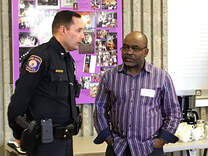 On April 25, the Grand Rapids Association of Pastors met at Grace Christian Reformed Church to hear from the Grand Rapids Police Department's Interim Police Chief David Kiddle and Deputy Chief Eric Payne. Chief Kiddle noted that he'd been with the GRPD for 26 years, with assignments in administrative and investigative "sides of the house." He isn't from Grand Rapids, but grew up in Sparta, New Jersey, which, he noted, "was not the armpit of the U.S., but a lovely spot." He came to the state go to Michigan State University for their criminal justice program. Deputy Chief Payne has been with the department for 32 years, and has held a similar breadth of assignments, including being in charge of the South Service Area for 7 years. He is from Dowagiac. Police Chief Selection Process After the introductions, the first topic Chief Kiddle addressed was the timeline for selecting the new police chief. Applications were closed on April 19 and they started phone interviews soon after that. The city's goal is to have "someone in the chair" on August 1st. He said that he is not a candidate for the position; however, Deputy Chief Payne is a candidate. Payne said, "The important thing is that the best person to be in the community and to lead the police department is chosen." Staffing Study A recent study determined that the GRPD had a sufficient number of sworn police officers to handle current call volumes, but that they could use some reorganizing and some more civilian personnel. Chief Kiddle explained the GRPD perspective on that study. He said that, "we had to decimate the department of civilians when we had the economic downturn to keep the sworn personnel, so they took those [previously civilian-held] jobs." They have not reorganized since that time, so the implication was that the GRPD needs civilian employees so they can transition sworn officers to the operations side. Kiddle said there were several options in the proposed 2020 budget for policing positions, including starting an evening community policing team, hiring a crisis intervention specialist, and creating a new public safety liaison position to increase oversight between the city manager's office and the police department. The budget has now reached the next step, but we haven't learned what, if anything, might have been cut from the public safety portion. We will post any updates about this as they become available on G-RAP's Facebook page. Policing at the Speed of Trust This is a program in which a police officer is paired with a community member, they go through a four-hour training together that teaches communication and trust-building exercises, and then they commit to have six 10-15 minute conversations over the next six weeks. It is designed to both build trust between the community and the police department, and to improve the police officer's communication skills. Kiddle said that, of the 295 officers in the GRPD, 80-90 still needed to go through the program, and they are in need of community members to partner with. He offered to bring the program to any church that is interested. If you have 10-15 people at your church who would be willing to meet one-on-one with a member of the GRPD as part of this program, please send us an email at [email protected] and we will send it along to Chief Kiddle. In response to a question about whether the GRPD has statistics about the effectiveness of the program, Deputy Chief Payne responded: When we announced it, people thought it was the magic bullet that would bring harmony between the police and the community, but it teaches people how to have a conversation. It's about building relationships and developing communication skills and empathy. We have feedback, but no numbers. One of our pastors who participated in Policing at the Speed of Trust and who holds an annual public safety day at his church, when they worship with public safety officers, values the rapport that these efforts have built. But another pastor who went through the program thinks that a different kind of training that more overtly addressed issues of implicit bias would have been more effective. Citizen Police Academy The GRPD offers a 10-week program, four hours, once a week, for civilians to come into the police department and get to know what they do very well. They are also trying out mini academies: one day, 9am - 4pm, lunch included, where they would cover use of force training, traffic stop training, internal affairs, and community engagement, and more. Chief Kiddle offered to do a mini academy just for pastors, if we were interested. Police Oversight There are three different bodies that have differing levels of oversight and review over the GRPD that Kiddle spoke about: the Internal Affairs Department, the Civilian Appeals Board, and the Michigan Civil Rights Review Board. The Internal Affairs Department has a lieutenant and a sergeant assigned to it, and there is an annual report available on the city website. (Go here to download it; the Internal Affairs section is the 9th page.) Kiddle said that anyone can make a report--you do not have to be a victim. There are also a number of ways you can report it: in person (1 Monroe Center NW), online, via a letter. (Go here to access the form and find out more about filing a report.) Chief Kiddle noted that the Civilian Appeals Board (CAB) exists and that "everyone who makes a complaint gets a certified letter about their rights to appeal." He did not want to get into whether the CAB should have subpoena powers or whether it should do more than it currently does. About the Michigan Civil Rights Review Board, Kiddle asserted that, "We open ourselves to outside objective review." He said, "We always assign someone one rank higher than the person being complained about" to investigate it, and acknowledged that they are "going back over some complaints." Recent Use of Force The conversation moved on to a couple of recent use of force incidents (some of which involved juveniles and open investigations, so we will not share details publicly), that resulted in a discussion about the training of GRPD officers. Kiddle defended their training: Our training is excellent. It keeps our officers safe, but it can come across as too aggressive at times. We use scenario-based training for everyone we hire. They get 1,000 different scenarios in 8 weeks. We had 503 use of force incidents out of 13,000 arrests in 2018. That's less than 4%. 17% is the national average. 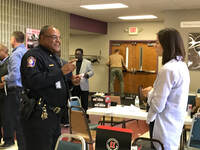 Pastors continued to ask about the training, to what degree it encouraged de-humanizing of the people officers interact with and to what degree it taught officers to de-escalate situations. Kiddle spoke to the Speed of Trust program: "We see people at their worst. Speed of Trust works because it reminds us that not everyone is a criminal." Payne said that their training is about de-escalation and told a story about someone he met who went through the Civilian Police Academy who had been negative towards the police: "I asked him how it went and he said he shot the baby, that he went through a scenario and panicked." ICE Policy Despite recent GRPD and ICE interactions being in the news, Kiddle did not talk much about this beyond extending an invitation to G-RAP to send representatives to a meeting on May 22 for community stakeholders to provide feedback on the ICE cooperation policy they were developing. Three G-RAP pastors attended the meeting; hopefully we will hear from them soon. The pastors expressed their concerns for the Hispanic community and their congregation members, and what it means for their safety when they fear the police in their own community. Miscellaneous Chief Kiddle wanted to mention that the police department does training for their officers in how to deal with people who are having a mental health crisis. They recently did a training that taught them about people with autism. The GRPD has a Network 180 liaison officer and they will sometimes try to get someone to Network 180 instead of arresting them. The GRPD is hoping to start a campaign to educate the public about what they should do when they are stopped by the police and they would like input from community stakeholders. GRPD and G-RAP As the question and answer period wound down, we discovered that some of G-RAP's previous conversations and meetings with former Chief David Rahinsky and other officers and representatives of the police unions hadn't made it farther than those individual conversations. Pastors' offers to help in certain situations went unheard and both parties could not take advantage of situations that could have built trust. This was disappointing and frustrating, and became a topic of discussion at our May meeting. At that meeting we resolved both to follow up conversations with the GRPD with letters in hopes that a record of the discussion would help build something more lasting and concrete, and to offer our services as on-call chaplains, since the GRPD is without a chaplain. We closed this meeting as we do all meetings with city officials: by praying for them, their work in Grand Rapids, their safety, and for our ability to work together so our community can thrive. On Thursday, March 21, Rev. Dale Dalman and his culinary team welcomed Grand Rapids-area pastors and Kent County Sheriff Michelle LaJoye-Young to Esperanza Covenant Church (and introduced a few pastors to the deliciousness of horchata, the sweet cinnamon rice milk drink).  LaJoye-Young was appointed sheriff in 2018 to replace retiring Sheriff Larry Stelma, making her the first female Kent County sheriff. Before that she was the county's first female undersheriff, chief deputy, captain, and lieutenant. She joined the department 30 years ago, fresh from Michigan State University, working there while she got first her Master's in Public Administration from Western Michigan University, and then her Associate's Degree in Law Enforcement from Grand Rapids Community College. Her appointed term will be up in 2020 and she plans to run for an elected term that fall. Before she educated the pastors about the job of sheriff and told us about her priorities, she wanted to say thank you: "I am very, very grateful for the opportunity to talk about the sheriff department's work with people who are doing good work, who are doing things in the community. What's often lost is that we are representatives of the people. If we're not working in unity, on the same track, then neither of us can do a good job." She also said that she's aware that she deals with people at what might be the worst time of their lives, either when they need emergency services or when they enter a corrections facility. That awareness, coupled with the acknowledgment that "people's actions are one thing and their heart is another," affects her decisionmaking when it comes to staffing and programming. Constitutional Office The Kent County Sheriff is a constitutional office, so LaJoye-Young's job is governed by the Michigan State Constitution. She is mandated by the constitution
For example, for the last point, a city like Lowell has a very small police department, so she said that, "if something significant happens, they call us." In places like Wyoming, Walker, and Kentwood, the sheriff's department has supplied forensic and supplemental investigative services. Grand Rapids is a large enough department that they help train each other and work together on task forces. The largest use of sheriff department resources in Grand Rapids is the correctional facility: "sixty percent of people in our facility were arrested in Grand Rapids." Emergency Calls Kent County covers 850 square miles, with 750 of those patrolled solely by the her department. LaJoye-Young said, "It takes a lot of analysis about where to have people staged to where they can get to calls. For priority one and two calls--where there is a threat to life and safety now, or threat of substantial property loss now--we try to get there within eleven to thirteen minutes. We try to distribute cars in that timing because people deserve that help on the worst day of their lives. That's my priority." She noted that, unfortunately, there are a couple of places in the corners of the county that currently take them 30 minutes to get to, and she's working on getting the resources to lower that time. There are nine levels of priority that they give to calls that come in from citizens, depending on the severity of threat, damage, and the immediacy of the problem. For lower-priority calls, to reduce the time officers spend on the road (for example, when someone needs a police report for insurance purposes when their car's been broken into), there are a number of ways citizens can make a statement: over the phone, online, or by coming into an office. This frees up officers for those priority one and two calls. Her "worst day" awareness filters through to her 911 operators as well. She worked to simplify the dispatch when there were problems with the 911 system, and she said, "customer service is our number one priority. The person calling 911 is having the worst day of their life--we have to treat them that way and give them the right information." Community Services Unit Another way the sheriff's department tries to cover that 750 square miles from a law enforcement perspective is to work with businesses, churches, and community groups to reduce opportunities for crime. The Community Services Unit works with churches and businesses to make sure that they're following best practices. Examples LaJoye-Young used were, "Church, don't keep your weekly collection in the unlocked desk drawer in the pastor's office. Also, a lot of churches are worried about hate crimes, so we ask, 'How can we help keep you safe?' We ask businesses, 'Is this the most safe way to store your firearms?'" They also run things like child safety seat checks to reduce the chance of injury in an accident. There is a school safety officer assigned to every school district except for Kentwood. This officer acts as a liaison, to educate staff and students. LaJoye-Young emphasized that one of the roles of this officer is to foster a relationship of trust with the students, and they've found that, where those relationships are built, students do come to the safety officer to tell them about things that are happening at home, and to tell them about break-ins at school. Kent County Jail The sheriff is constitutionally mandated to operate and maintain a jail, and the Kent County Jail takes 60% of LaJoye-Young's budget and staffing. Life in the jail has changed a lot since she started 30 years ago: In 1989, I first heard those bars clang behind me and I thought, "what did I do?" I saw the people in cages and thought, "we can do better." I was part of a concept project in 1991-2 for direct supervision; in 2012-13 we finished it and are now set up in pods, in day rooms instead of in cages all day. We are the best jail in the state of Michigan because we have the best programs. We have a captive audience in the jail and that's an opportunity to pour into them--they won't all listen, but it's an opportunity and I feel called to pursue it. She noted that 70% of people in the jail are there pre-trial, accused but not convicted, so they are eligible for programs if their behavior allows it. The remainder are convicted of multiple misdemeanors or a low-level felony so, as she said, "we know exactly how long we have to pour into them." The department encourages people to take advantage of their many programs "to learn to make better decisions, to have a better life" when they get out. She mentioned the God Pod, a life principles pod, a work release program, and medically assisted treatment program for opioid recovery. The people who take part in the God Pod are 50% less likely to recidivate. Immigration and Customs Enforcement (ICE) Since LaJoye-Young and ICE have been much in the news lately, I want to let her explain the situation in her words: 2010 was my first orientation with ICE, and things haven't changed significantly since then. I want to point out that the Obama administration had the largest number of detainers filed, larger than the Trump administration's, so this isn't a Democratic or a Republican question, but a people question. She noted that there are three immigration laws that are criminal offenses that ICE could get a judicial warrant for:
She wants law enforcement to be able to pursue people "who come back over our borders and preys on people," but she would like to see ICE's procedures brought into line with constitutional due process: "Our system is set up so that it can't be just one person's opinion, just one set of eyes, that there has to be review. That's for the protection of our citizens." LaJoye-Young acknowledged that the problems stemming from immigration go deeper than she can address with any change in policy at her level. She said her priorities are getting to people who need help and trying to prevent crime; she knows that there are people in Kent County who are afraid to call 911 because of their immigration status, but for that problem to be truly fixed, there need to be immigration solutions at the federal level. Cultural Intelligence Towards the end of our time together, one pastor asked her about how the sheriff's department worked with communities of color. Her answer was part cultural and part practical: Start with listening and everyone's better served. I want my officers to walk into every situation thinking they have to learn. We've contracted with a cultural intelligence group, and we learn about implicit bias on many different levels. I mean, I'm the only acting female sheriff in Michigan, one of 2% in the country! If you have a problem with law enforcement, become an officer and change the culture. We want to recruit people who want to help people. Rev. Dalman closed out our question time by asking LaJoye-Young what she, as the first woman to hold so many different jobs at the sheriff's department, would say to a bunch of male clergy. She said: Help every young lady believe in herself. Self-love keeps her less likely to be a victim of a crime. Take every opportunity to encourage her to love herself. A lot of women don't see themselves as leaders. I say, "I'm a team of one and I'm a leader." Encourage women to say that to themselves and they'll behave differently and they'll try to fix things in a way leaders do. We closed our meeting with Kent County Sheriff Michelle LaJoye-Young as we do all our meetings with elected officials, by praying for her and for the community we all serve.
We are grateful to Mayor Rosalynn Bliss and to all the pastors who resisted the call to hibernate during our endless cold snap and came out for G-RAP's February 21 meeting. Thank you, also, to Pastor Jathan Austin and his One Church Empowerment Center team for their warm hospitality. Mayor Bliss started the meeting by giving us some updates on major issues in Grand Rapids, and then she took questions, but first she gave a shout out to the pastors in the room she had worked with in city government: "I'm so grateful to serve with such an awesome group of public servants, people who truly have servant hearts." Environmental Sustainability Bliss had come from a sustainability summit earlier that day, so that topic was the first she addressed. She noted that the city has aggressive goals to eventually use 100% renewable energy. One of the tools she's most excited about is the biodigester the city is building to turn waste into clean energy. The city is also looking into adding solar arrays around the waste water processing plants. They are looking to move some yard waste composting into the city, instead of trucking it outside the city limits. One of the highest environmental priorities for Bliss is lead poisoning. She has been working on that issue for 14 years, since the Granholm administration, but that has moved into a higher gear since last year, when 49507 had the most children who tested for high blood lead levels in the state of Michigan: "That is not the number 1 list I wanted to be on," she said. To address that jump, Bliss has created a Kid's Commission, and the city is working with the county and with a researcher in Chicago. One of the major issues is how to get funds for remediation, and she's hopeful that the new governor will work with us, since Whitmer has said that environmental issues are a priority for her. Police Chief Grand Rapids is in the middle of searching for a new police chief. However, it is City Manager Mark Washington who will be hiring the new police chief. As Mayor Bliss said, "I don't get to do that." She does, of course, have hopes for the person who is hired: "We have a long way to go to have a partner who can work with the community." There will be community surveys and meetings to solicit community input about the position, and she hopes that pastors will participate in those. She also noted that she will be getting briefed on violence prevention measures and the Cure Violence and Ceasefire proposals. Affordable Housing Mayor Bliss noted that Grand Rapids has come a long way from 10 years ago, when it was in a foreclosure crisis: Now we have one of the hottest real estate markets in the country, but with that comes families priced out of homes and neighborhoods. So we've changed zoning codes, we've created programs to help those facing evictions, we're going after low-income tax credits. We just had the ribbon-cutting for the Genesis Non-Profit Housing Corporation's project at St. James School. The majority of the 52 units at the old St. James Catholic School will be set aside for those earning thirty to sixty percent of of Kent County’s area median income, with 13 units reserved for persons with special needs. The elimination of the Kent County Land Bank in December of 2018 has meant that the city can no longer rely on its assistance in creating affordable housing, so "We're looking at what our options are how that we don't that those tools," Bliss said. Equitable Economic Plan "The flipside of affordable housing is wages," Bliss said. She's committed to making sure that the city is making an impact with its policies where the need is greatest. City Manager Mark Washington's previous city, Austin, was a Racial Equity Here site, and Bliss is grateful for the knowledge he has brought with him to Grand Rapids. The city has a team looking at ordinances and policies to see whether city practices are having a heavier impact on certain neighborhoods. For example, they found an unexpected effect of having a complaint-based system when it came to getting things like streetlights fixed. She said that they noticed that residents who tend to call about streetlights out tend to be in affluent neighborhoods; in neighborhoods where people struggle more to meet their basic needs, they don't call, and the light never gets fixed. Two years ago, Bliss announced the formation of the Grand Rapids Racial Equity Initiative, which is chaired by her and Dr. Bill Pink of Grand Rapids Community College. They have pulled together 35 large employers and are looking at how they can be intentional about hiring a more diverse workforce. They are involved in training companies to build evidence-based hiring practices. As Bliss said, "It's our policy to lead by example, so it's key to have people to work with like Nate Moody and Mark Washington." River Restoration Project Bliss smiled as she said that she's learned more about the snuffbox mussel, an endangered species that lives in the Grand River, than she knew there was to learn, but assured the pastors that the river restoration project is moving ahead--just slowly. They are submitting permits and plans and making sure that the snuffbox mussel population won't be negatively affected and that lampreys won't be able to swim upstream. Next, state and federal agencies must review those permits and plans. Once that review has happened, Bliss said that they will add another level of priority: "When we start bidding we want to give priority to local, minority, and women-owned small businesses." In the meantime, the city is working with the John Ball Zoo, the Public Museum, and the Wege Foundation to plan how to use the project as an educational experience for children. QUESTION TIME Immigration In response to one of the pastors asking about immigration issues, Bliss said, One of the most infuriating issues has been to see the impact of national policies on our immigrant communities. There is a frustrating lack of ability of local authorities to have any impact on the practices of ICE. Lots of mayors are struggling with this. We recently had an issue with an American citizen arrested by ICE and we're looking at what happened, but we are happy with the changes the county made. [Kent County ended its practice of holding people in jail for Immigration and Customs Enforcement unless a judge has signed an arrest warrant.] Bliss pointed out that Grand Rapids "came out years ago and committed to being a welcoming city. We will not ask for your status when serving you." The city is working at analyzing how it welcomes immigrants and at developing a strategic plan for honoring and celebrating diversity. An issue related to this that concerns Bliss is the 2020 Census and the danger of not getting an accurate count because of the citizenship question that will likely be part of it--an inaccurate count would affect funding and representation. She and City Commissioner Nate Moody have started a Complete Count Committee to get the word out and work towards making sure everyone gets counted. Opioid Crisis Bliss said that Grand Rapids, along with other cities, is suing three large pharmaceutical manufacturers because "money impacts practices." She noted that all of their police officers and firefighters carry Narcan and Naloxen, which can reverse an overdose. With the hiring of a new police chief on the horizon, she is hopeful that we can take another look at how we treat those who are in a mental health crisis or having an addiction issue: "Can we divert them from jails? There are innovative and creative models out there." Returning Citizens The city has been partnering with a number of organizations to help returning citizens. She was excited that the CLEAR program (Coalition, Leadership, Education, Advice Rehabilitation) started serving women in the last year (this is a program housed at Oakdale Park Church, which has multiple pastors active in G-RAP). The city is working with NextStep both for employment and for housing for returning citizens. Bliss is passionate about the issue of "banning the box": removing the question on applications about whether a job applicant has a criminal record. She said, "The city needs to be the model for hiring and banning the box. I'd love to ban the box locally, but the state pre-empted us and prevented us from doing that." She's also working with other mayors on these issues: I'm part of an urban core mayor's group in Michigan and we've been talking about returning citizens for a long time. There are several pieces of legislation out there to reform corrections that are good practices that we're supporting. Divided Times One of the pastors asked Mayor Bliss about how she leads in these divided, contentious times. Part of her answer was to call on us, community and faith leaders, to continue to build relationships with each other and with elected officials so we can have tough conversations with each other and hold each other accountable. But, she also pointed out, You also can assume that we know what we're doing and we'll never make a mistake. We have to get back to seeing people as brothers and sisters and giving each other grace. We have to do that because we respect each other. It's easy to make your circle smaller because things are so nasty out there, but that's the worst thing to do. Bliss practices what she preaches: when people post terrible things about her or about the city on social media, she makes a point of calling them and inviting them to speak with her. She did that recently, and the woman came and they spoke; they don't always wind up agreeing with each other, but the tone of communication becomes less heated and more respectful. We closed our meeting with Mayor Bliss as we do all our meetings with city officials, by praying for her and for the community we all serve. If you are a Christian pastor in the Grand Rapids area and you are interested in issues of justice, unity, and reconciliation, please join us for our next meeting: Thursday, March 21, 11:30am - 1:00pm, at Esperanza Covenant Church, 1933 Tremont Blvd. NW, when our guest will be Kent County Sheriff Michelle LaJoye-Young. If you are interested in seeing more from Mayor Bliss about many of these same topics, below is the State of the City address she gave less than a week after our meeting: |
AuthorNatalie Hart Archives
September 2023
|

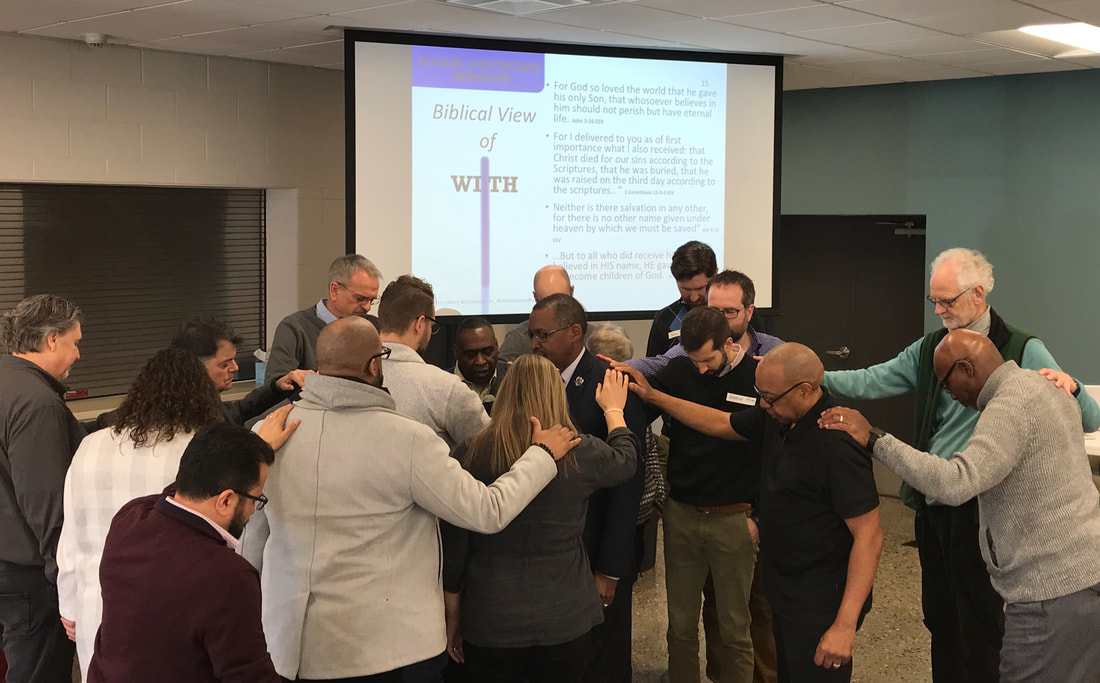


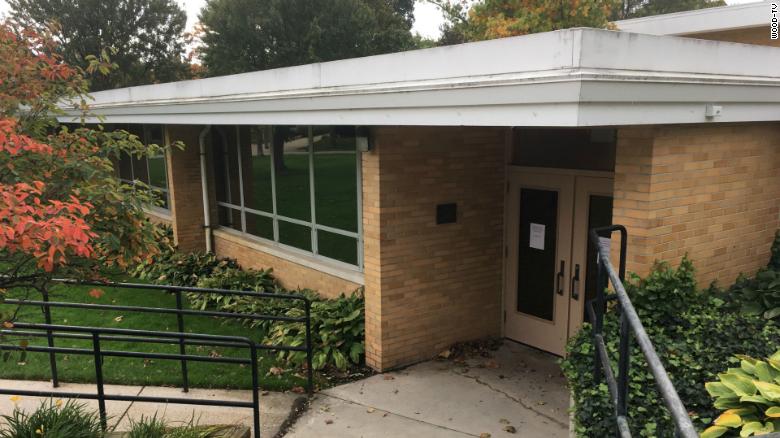
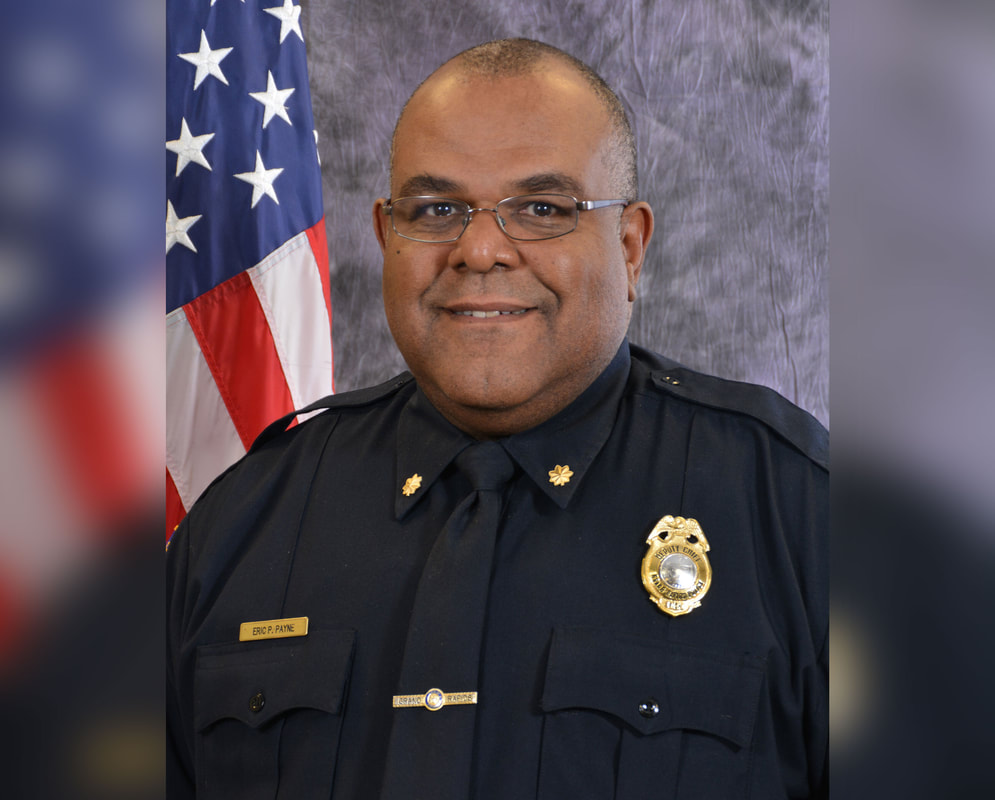
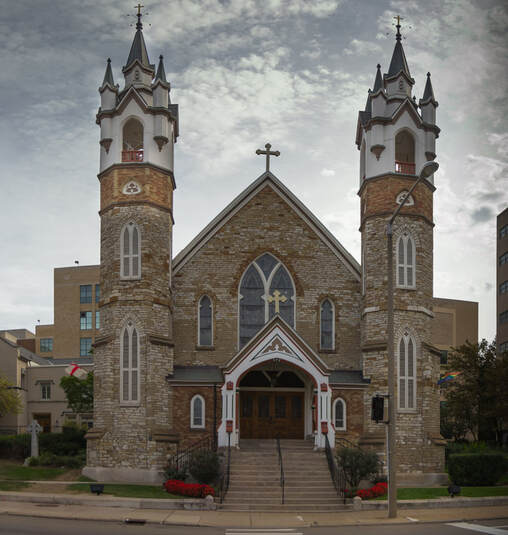
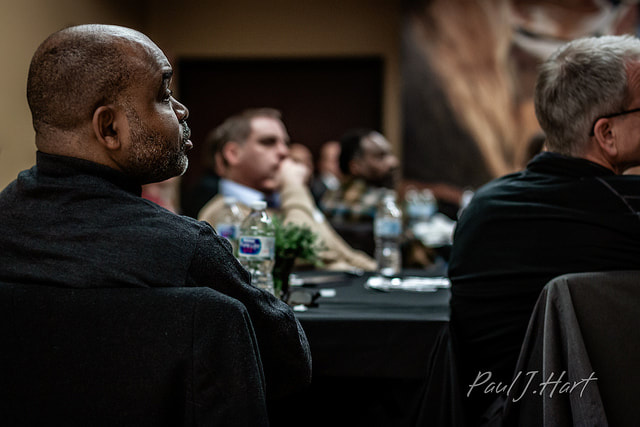
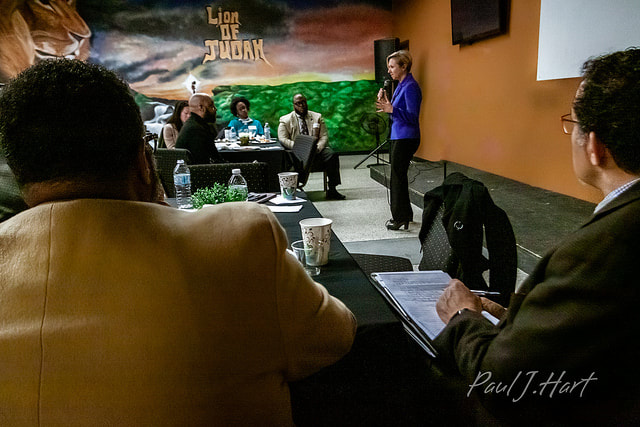
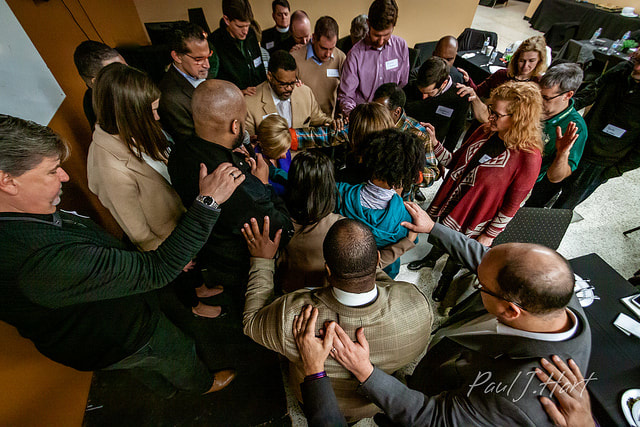
 RSS Feed
RSS Feed